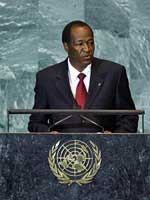Burkina Faso
H. E. Mr. Blaise Compaoré, President
24 September 2008
- Video: English | French [RealPlayer - 11 min]
- Statement: French [PDF]
- Back to the list of speakers
Statement Summary

© UN Photo
Click for caption and to enlarge
BLAISE COMPAORÉ, President of Burkina Faso, said the Assembly’s current session was taking place in an international context marked by threats to peace. It was a crucial session that, at the same time, provided an opportunity to assess the situation, and he welcomed the initiative to review attainment of the Millennium Development Goals, the results of which would help to create appropriate strategies.
He said the global food crisis reflected the fragility of food production and commodities trading systems. It was vital, therefore, to relaunch agricultural investment, and support farmer and professional organizations in innovative partnerships. It was also important to invest in farming, and more effectively distribute seeds and fertilizers. He added that the energy crisis was driving the search for renewable sources.
Official development assistance had dropped in recent years -- both in level and effectiveness, he said. Along with that, there were four crucial considerations that required attention: ownership of economic policies and capacity-building for governance; harmonization of donor procedures; the gradual alignment of assistance with development priorities; and greater coordination with partners on the ground, under the supervision of Governments.
He went on to say that the scourge of narcotics was a threat to Africa, including the West African subregion. Some parts of his country had encountered cross-border criminality. On the environmental front, the international community must invest more to bring about progress on climate change.
Resolving conflicts around the world and in Africa was a major challenge, he said, adding that his country, which held the Chairmanship of the Economic Community of West African States (ECOWAS), was making its contribution to enhancing peace and security, a priority needed for ensuring democracy. He welcomed progress gained through major mediation efforts that allowed Africans to resolve issues among themselves.
Discussing such efforts, he said Burkina Faso was taking part in the United Nations peacekeeping operations in Darfur, and was concerned at the “erosion” of the Somali nation. On the Western Sahara, he noted Morocco’s involvement and the Security Council’s appeal for a realistic settlement, which provided encouraging hopes. The greater Sahara region had been infected by insecurity, and collective dialogue was needed. Welcoming progress in the Middle East, notably towards the creation of a viable Palestinian State, he also appealed for “reason” to ensure that negotiations would recognize Iran’s right to have civil nuclear power.
On other issues, he said news today was dominated by conflict in the Caucasus and Senegal, which supported negotiations, hoped a solution based on inclusive dialogue. Highlighting relations between China and Taiwan, he hoped to see participation by Taiwan in the activities of international organizations.
[Source: GA/10751]